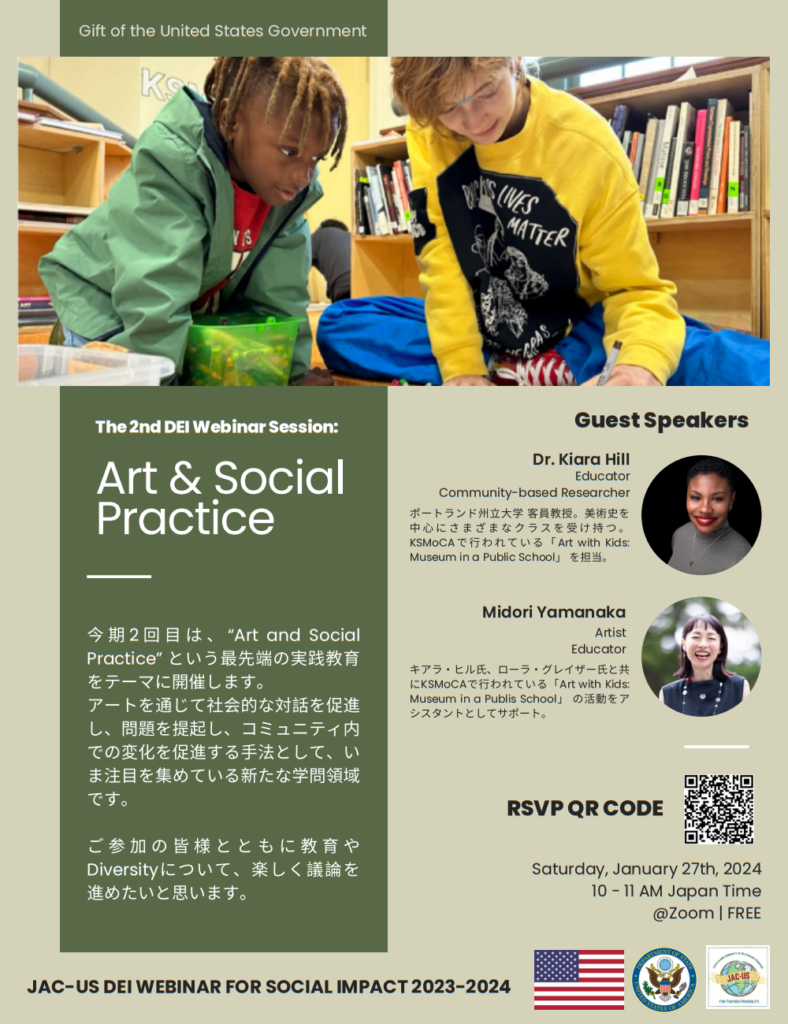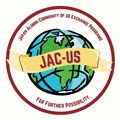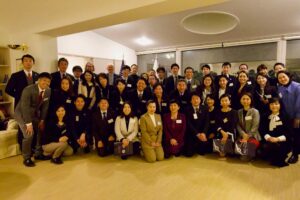[Report] DEI Webinar #2: KSMoCA as Social Practice

Date:
January 26, 2024
Topic:
DEI Webinar #2: KSMoCA as Social Practice
Speakers:
Dr. Kiara Hill
Midori Yamanaka
MC:
Chiho Kato (JAC-US)
① Art and Social Practice:
Art and Social Practice represents a contemporary art movement that is highly dynamic and diverse. This field, housed within Portland State University's (PSU) Master of Fine Arts (MFA) program, encompasses a variety of practices known interchangeably as socially engaged art, participatory art, relational art, dialogical art, social practice, and social art. The terminology varies among artists and scholars, reflecting the ongoing debates and the evolving nature of this discipline. Despite these differences, a common thread among these practices is their commitment to fostering social engagement and dialogue through art.
PSU's MFA program, launched in 2007, has been pivotal in pushing the boundaries of contemporary art by integrating social practice. A prime example of this integration is the King School Museum of Contemporary Art (KSMoCA), a unique blend of a contemporary art museum and a social practice art project situated within Dr. Martin Luther King Jr. School. KSMoCA serves as a testament to the program's dedication to merging art, education, and community engagement, aiming to make art accessible to everyone and connect the museum, public school, and university in meaningful ways.
PSU is recognized for its open and integrated approach to education, with a campus that seamlessly blends into the surrounding cityscape. This approach fosters a strong sense of community and accessibility, further emphasized by PSU's reputation in urban development and policy. The university's capacity for building horizontal connections across different institutions underscores its commitment to collaboration and social engagement.
② Main Activities of KSMoCA:
KSMoCA's activities exemplify the core principles of art and social practice including:
- Art with Kids: Museum in a Public School, drawing participants from diverse backgrounds.
- Workshops with Visiting Artists
- Mentorship Program that fosters one-on-one relationships between university and elementary students.
- Artist Talks and Exhibits, which bring globally renowned artists to the community, enriching it with exhibitions and art discussions.
③ The Value of KSMoCA:
Dr. Kiara Hill, reflecting on KSMoCA's impact, highlights the importance of making art relatable and accessible, especially to those from underrepresented backgrounds. She notes the scarcity of museum experiences that resonate with the lives of Black individuals, including her own. KSMoCA not only provides a space where children can interact with diverse narratives and life choices but also inspires them to envision futures they might not have considered possible, such as becoming a documentarian. Hill's efforts to extend KSMoCA's reach through external exhibitions have created narratives that shape the concept of these exhibitions, offering profound experiences for both the children and university students involved. These initiatives remind participants of the joy and purity of artistic expression, often lost amidst the professional challenges faced by artists.
In summary, Art and Social Practice at PSU and through KSMoCA exemplifies the powerful role of art in community engagement and social change. By connecting art, education, and community, these initiatives demonstrate art's potential to positively influence society and shape future generations.


